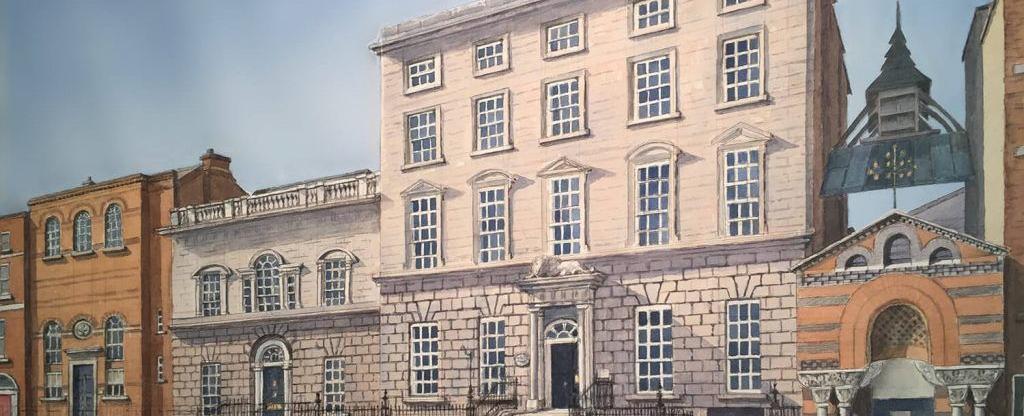Newman's University Journal and Its Significance

St. John Henry Newman is well known as a philosopher of education; however, his time as a practitioner is less known. In fact, he founded the Catholic University of Dublin in Ireland beginning in 1851 at the behest of then Archbishop of Armagh and soon to be Archbishop of Dublin, Dr. Paul Cullen. An important source that details how Newman built the university and its practical challenges along the way is his University Journal.
The journal is perhaps one of Newman's most practical texts on education due to the intimate voice that Newman uses to describe the difficulties and particularities of founding a university. This task of setting up the Catholic University was an incredibly complex and difficult one and demanded not only educational principles but a great deal of educational prudence. Newman faced enduring and prominent anti-Catholic feelings in the British government, the lack of support from many of the Irish Bishops who were anti-English, and the widespread belief of there not being "the class of youths … who would come to the University."[1] In addition to many of these "outside" pressures, Newman also articulated in his journal the majority of his administration decisions, hopes for what the university might become, and difficulties he encountered along the way. Because of this, I argue that the University Journal should be regarded as one of Newman's important educational texts because it outlines Newman's praxis of a university. In this short essay I outline the importance of the University Journal to Newman and its significance for scholars today.
Newman's University Journal recorded the practical details of University developments: professorships, lectureships, and tutorships offered by Newman, the specifics regarding his travels to and from Dublin, and detailed financial transactions and commitments from university buildings and salaries. In addition to this, he recorded moments of crisis when his plans were upended due to concerns over the permanence of professorships and Irish concerns over English and Scottish appointments. In essence, the aim of his journal was to record all the practical dealings of founding a university. Thus, he named it "My University Journal, private" and referenced it at length when he compiled his 1873 "Memorandum about my connection with the Catholic University" and essay, "What I Aimed At," which was printed in the posthumously published My Campaign in Ireland (1896).[2] In both documents, Newman primarily used his University Journal when he described his attempts to put into practice the ideals of education he wrote on in The Idea of the University and Rise and Progress.[3] To this end, the University Journal proves an invaluable document, which helped Newman later in life to articulate how he had attempted to practically adopt his theoretical writings when founding the Catholic University.
The University Journal is also one of the most extensive private records that Newman wrote during his Catholic period, and scholars thought it had been lost for many years until A. Dwight Culler discovered it again 1955.[4] By itself, the journal demonstrates Newman's own organizational skills and determination to see a project succeed. However, Newman used the journal for the same reason that it is primarily important to Newman scholars today: it is the contemporary record of Newman's attempts at setting up a Catholic University. While his journal is not always perfect or punctual with its entries, Newman's extensive use of it, from November 1853 to December 1854, allows scholars to track the daily and weekly progress or setbacks of the university. These entries include: 1) important conversations and appointments, 2) his health and travel around Ireland, 3) the financial situation of the university, and 4) his ever-contentious relationship with the bishops of Ireland. Beginning in January 1855, Newman's entries considerably subsided, with only one entry during that month, four entries between April and July 1855, and two final entries in March 1856.
This fluctuation in entries provides scholars with an imperfect and broken record of the first two and half years of the university, but it also offers a unique and private voice that slowly trails off as the university comes to fruition. Do these silences between entries suggest that once the university was underway there was no longer a pressing need for detailed notes? Were the annual reports he compiled for the Irish Bishops regarding the university taking the place of the journal? Why did particular events in 1855 and 1856 warrant Newman's return to the journal? These sorts of questions come to life as a new voice of Newman emerges from the pages of the University Journal. In the journal, Newman neither addressed the Irish public, like he did in The Idea of the University and Rise and Progress, nor wrote reports to the Irish archbishops or documents for future generations, like those found in My Campaign in Ireland and the 1873 Memorandum. Instead, the University Journal was composed to help Newman keep a frank and honest record of the web of details that constituted the founding of a university. Newman's private voice draws the reader into the intimate thoughts he had concerning the university and shines a light on his understanding of the practicalities of university life and administration.
The University Journal demonstrates a new lens through which to read Newman's understanding of the university and provides scholars with a fuller picture of Newman the educator. His practical approach to education is a good resource for parents, teachers, and administrators as they look to correct some of the major challenges facing our present-day educational system. While the University Journal does not contain specific answers to some of our big educational questions, it does provide many examples of Newman's insistence that professors and tutors enter into the project of the Catholic University "con amore," or with love. It also provides valuable details regarding the importance of setting up trade schools (i.e. medical and engineering schools) and includes recruiting strategies. It is through these sorts of topics that Newman demonstrated his ability to pair the practical with the theoretical and demonstrates that he should not be considered only a theoretician of education. This unique view of Newman as administrator engages the reader in the practical questions of education and clarifies Newman's own understanding of the practice of the university.
[1] Newman, "My University Journal, private," 9–10.
[2] Newman, My Campaign in Ireland (University of Aberdeen: A. King & CO., 1896), 290. See also, Pádraic Conway, Journal of a Frustrated Soul: John Henry Newman’s Dublin Diary (November 1853—March 1856) and the Perceived Failure of the Catholic University of Ireland 70 (Fall 2009) and Colin Barr, Paul Cullen, John Henry Newman and the Catholic University of Ireland, 1845–1865 (Leominster: Gracewing, 2003).
[3] Many Newman scholars, such as Mary Katherine Tillman and Fergal McGrath, widely observe that Newman wrote three great works on education. (i.e., Rise and Progress and The Idea of the University, parts 1 and 2). Perhaps, My Campaign in Ireland should be considered Newman's fourth great book on education, given its approach to the practical implementation of his educational ideals outlined in his previous three books. See Mary Katherine Tillman, John Henry Newman: Man of Letters (Milwaukee, WI: Marquette University Press, 2015), 123.; Fergal McGrath, Newman's University: Idea and Reality (London: Longmans, Green, and Co., 1951), 319.
[4] Both Wilfrid Ward and Fergal McGrath noted that they were unable to locate the University Journal. McGrath states that the University Journal "would doubtless have been a valuable document." See Ward, Life of Cardinal Newman, vol. 2 , 321.; and McGrath, Newman's University: Idea and Reality.
Share
Eamon Naughton
Student, University of St. Thomas (MN)
Eamon Naughton is currently in his second semester of the Catholic Studies Master's Program at the University of St. Thomas (MN). Eamon's research on Newman's University Journal is a part of a boarder project which aims at publishing an edited collection of Newman's educational writings surrounding the practice of the university.
Topics
Newsletter
QUICK LINKS

